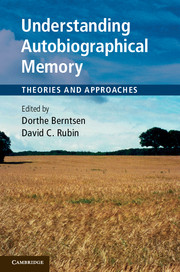Book contents
- Frontmatter
- Contents
- List of figures
- List of tables
- List of contributors
- Preface
- Acknowledgements
- 1 Introduction
- Part I Approaches to the study of autobiographical memory
- Part II Neural studies of autobiographical memory
- Part III Social and cultural aspects of autobiographical memory
- Part IV Development of autobiographical memory from infancy to old age
- Part V Evolution and basic processes of autobiographical memory
- 14 Evolutionary origins of autobiographical memory: a retrieval hypothesis
- 15 Spontaneous recollections: involuntary autobiographical memories are a basic mode of remembering
- 16 Autobiographical memory and future thinking
- Part VI Discussion
- Index
- References
15 - Spontaneous recollections: involuntary autobiographical memories are a basic mode of remembering
Published online by Cambridge University Press: 05 November 2012
- Frontmatter
- Contents
- List of figures
- List of tables
- List of contributors
- Preface
- Acknowledgements
- 1 Introduction
- Part I Approaches to the study of autobiographical memory
- Part II Neural studies of autobiographical memory
- Part III Social and cultural aspects of autobiographical memory
- Part IV Development of autobiographical memory from infancy to old age
- Part V Evolution and basic processes of autobiographical memory
- 14 Evolutionary origins of autobiographical memory: a retrieval hypothesis
- 15 Spontaneous recollections: involuntary autobiographical memories are a basic mode of remembering
- 16 Autobiographical memory and future thinking
- Part VI Discussion
- Index
- References
Summary
I was running in the Botanical Gardens, while planning my day. It was a frosty, quiet, and beautiful day. I was running lost in my thoughts – and suddenly I ran over some slippery, frozen puddles. I suddenly remembered another run, also on a frosty day. I had passed another runner, with long, ruffled hair, and a big smile, who yelled: “Take care on the ice!”
Autobiographical memories often arise involuntarily, that is, with no preceding retrieval effort, as illustrated by the example. However, most research on autobiographical/episodic memory still works under the assumption that conscious recollections of past events normally require a goal-directed and controlled (voluntary) retrieval process. For example, in his seminal book, Tulving (1983) argued that “access to, or actualization from, the episodic memory system tends to be deliberate and usually requires conscious effort” (p. 46). Mandler (1985) observed that episodic retrieval in general is “deliberate and consciously accessed” (p. 94), while acknowledging that “much of everyday memory experiences are in fact non-deliberate” (pp. 102–103). More recently, Davachi and Dobbins (2008) stated, “Occasionally, a memory will just pop into one’s head wholly uninvited. Although we have all had such involuntary recollections, they are arguably not the norm. . .” (p. 115). Here I am going to challenge this view by arguing that involuntary recollections are a basic mode of remembering.
A basic mode of remembering
On the first pages of his groundbreaking book on memory, Ebbinghaus (1885) identified three basic modes of remembering, a voluntary conscious mode, an involuntary conscious mode, and a non-conscious mode. However, since Ebbinghaus, modern cognitive psychologists have generally ignored the category of involuntary conscious memories (see Berntsen, 2009; Hintzman, 2011, for reviews). In contrast, involuntary conscious memories have received substantial attention in the field of clinical psychology, but almost always in relation to emotionally stressful experiences or psychological disorders (e.g., Brewin, Dalgleish, and Joseph, 1996; Ehlers, Hackmann, and Michael, 2004).
- Type
- Chapter
- Information
- Understanding Autobiographical MemoryTheories and Approaches, pp. 290 - 310Publisher: Cambridge University PressPrint publication year: 2012
References
- 22
- Cited by



